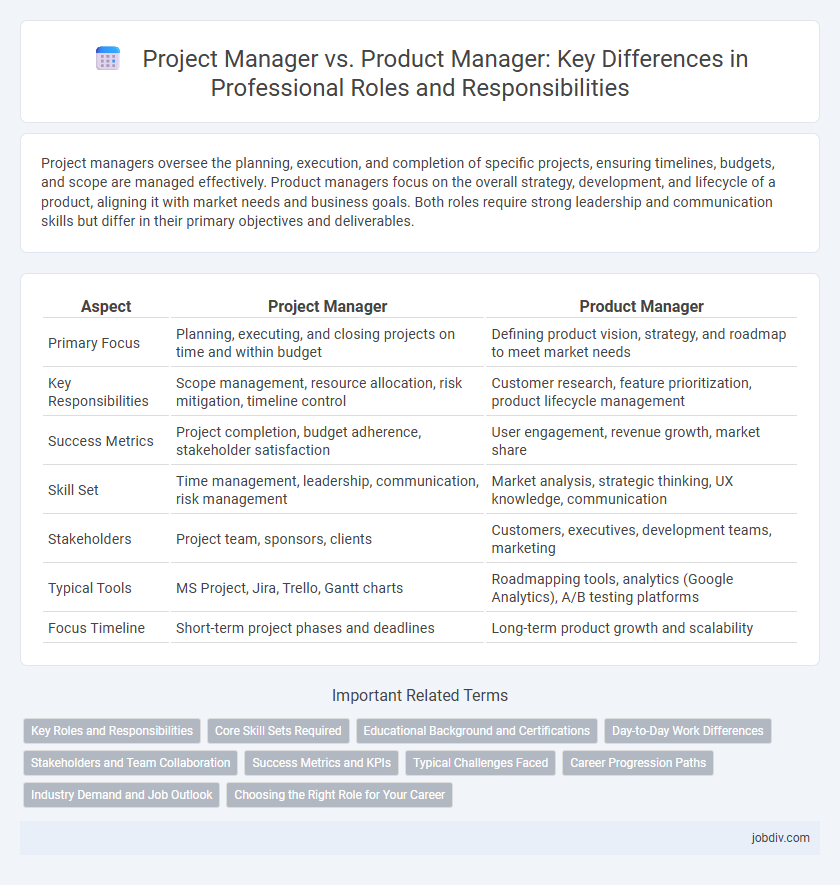Project managers oversee the planning, execution, and completion of specific projects, ensuring timelines, budgets, and scope are managed effectively. Product managers focus on the overall strategy, development, and lifecycle of a product, aligning it with market needs and business goals. Both roles require strong leadership and communication skills but differ in their primary objectives and deliverables.
Table of Comparison
| Aspect | Project Manager | Product Manager |
|---|---|---|
| Primary Focus | Planning, executing, and closing projects on time and within budget | Defining product vision, strategy, and roadmap to meet market needs |
| Key Responsibilities | Scope management, resource allocation, risk mitigation, timeline control | Customer research, feature prioritization, product lifecycle management |
| Success Metrics | Project completion, budget adherence, stakeholder satisfaction | User engagement, revenue growth, market share |
| Skill Set | Time management, leadership, communication, risk management | Market analysis, strategic thinking, UX knowledge, communication |
| Stakeholders | Project team, sponsors, clients | Customers, executives, development teams, marketing |
| Typical Tools | MS Project, Jira, Trello, Gantt charts | Roadmapping tools, analytics (Google Analytics), A/B testing platforms |
| Focus Timeline | Short-term project phases and deadlines | Long-term product growth and scalability |
Key Roles and Responsibilities
Project Managers oversee the planning, execution, and completion of specific projects, ensuring deadlines, budgets, and scope are met through resource coordination and risk management. Product Managers focus on defining product vision, strategy, and roadmap, aligning stakeholder requirements with market demands to maximize product value and customer satisfaction. Both roles require strong leadership and communication skills but differ primarily in scope--Project Managers concentrate on project delivery, while Product Managers drive product success across its lifecycle.
Core Skill Sets Required
Project Managers require expertise in planning, risk management, resource allocation, and stakeholder communication to ensure project delivery on time and within budget. Product Managers focus on market research, customer insights, product lifecycle management, and strategic prioritization to drive product success and align with business goals. Both roles demand strong leadership, problem-solving skills, and the ability to collaborate cross-functionally across teams.
Educational Background and Certifications
Project Managers often hold degrees in business administration, engineering, or information technology, complemented by certifications like PMP (Project Management Professional) or PRINCE2, which emphasize process management and leadership skills. Product Managers typically possess educational backgrounds in marketing, business, or computer science, with certifications such as Certified Scrum Product Owner (CSPO) or AIPMM's Certified Product Manager that focus on market analysis, product lifecycle, and customer needs. Understanding these distinct educational paths and certifications highlights the specialized expertise required for managing projects versus driving product vision and strategy.
Day-to-Day Work Differences
Project Managers focus on planning, executing, and closing projects, managing timelines, budgets, and resource allocation to ensure deliverables meet specified criteria. Product Managers prioritize product strategy, roadmap, and feature definition, collaborating closely with cross-functional teams to align product development with customer needs and business goals. While Project Managers handle project scopes and milestones, Product Managers continuously assess market trends and user feedback to drive product evolution.
Stakeholders and Team Collaboration
Project Managers coordinate cross-functional teams to ensure timely delivery of project milestones while managing stakeholder expectations and resource allocation. Product Managers engage closely with stakeholders to define product vision, prioritize features, and synchronize collaboration between engineering, design, and marketing teams. Effective communication and alignment between both roles drive successful product development and stakeholder satisfaction.
Success Metrics and KPIs
Project Managers prioritize success metrics such as on-time delivery, budget adherence, and scope management to ensure project completion within defined constraints. Product Managers focus on KPIs like customer satisfaction (NPS), user engagement, and revenue growth to measure product-market fit and long-term value creation. Aligning these distinct metrics facilitates collaboration and drives overall organizational success.
Typical Challenges Faced
Project Managers frequently encounter challenges related to scope creep, resource allocation, and maintaining project timelines, which require adept coordination and risk management. Product Managers often grapple with prioritizing features based on market feedback, aligning stakeholder expectations, and driving product vision amidst evolving customer needs. Both roles demand strong communication and decision-making skills to address these complex and dynamic obstacles effectively.
Career Progression Paths
Project Managers typically follow a career progression that advances from managing individual projects to overseeing multiple projects or programs, eventually moving into roles such as Program Manager or Portfolio Manager. Product Managers often progress from managing specific product features to leading entire product lines, with potential advancement to roles like Senior Product Manager, Director of Product, or Chief Product Officer. Both paths require increasing leadership, strategic planning, and stakeholder management skills to drive organizational goals effectively.
Industry Demand and Job Outlook
Project Managers are in high demand across industries such as construction, IT, and healthcare due to their expertise in scope, time, and budget management. Product Managers show robust growth prospects especially in tech sectors, driven by the need to align product development with customer needs and market trends. The job outlook for both roles remains strong, with Product Managers expected to see higher salary growth due to their strategic impact on revenue and innovation.
Choosing the Right Role for Your Career
Project Managers excel in overseeing specific initiatives, coordinating resources, timelines, and deliverables to ensure project success within scope and budget. Product Managers focus on defining product vision, strategy, and market positioning, driving customer-centric development and business growth. Understanding your strengths in operational execution versus strategic innovation is crucial when choosing between these roles for long-term career advancement.
Project Manager vs Product Manager Infographic

 jobdiv.com
jobdiv.com